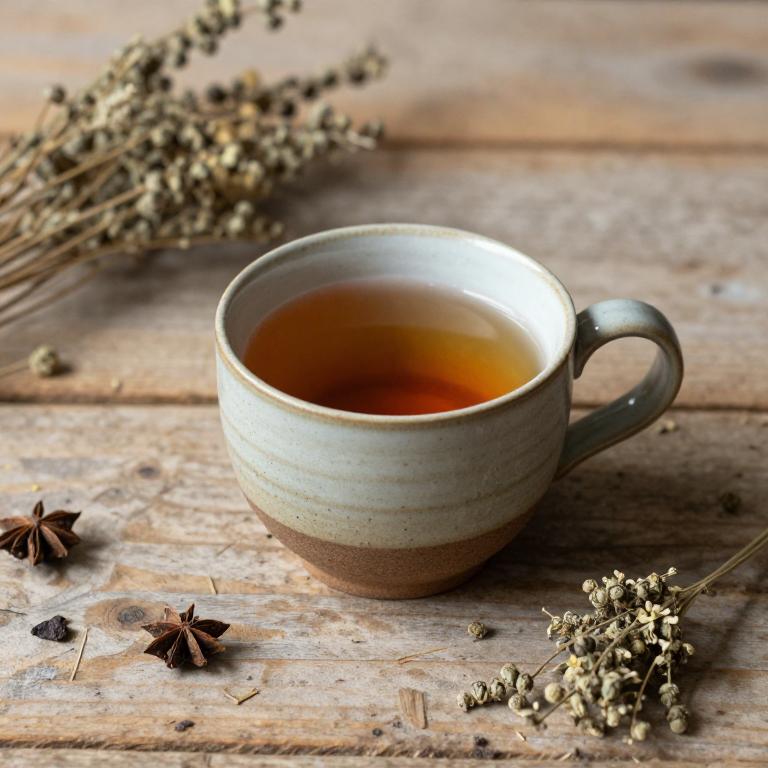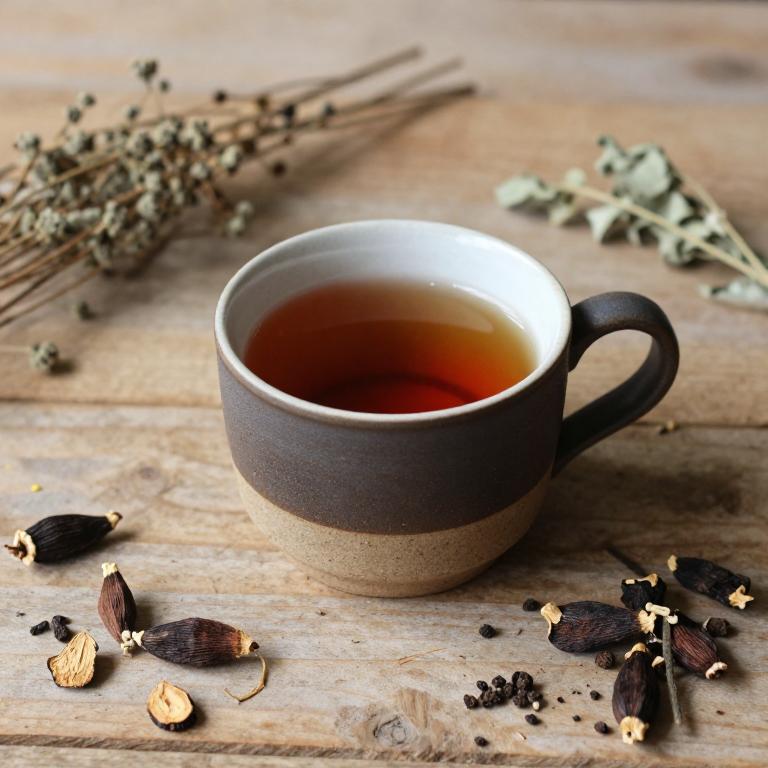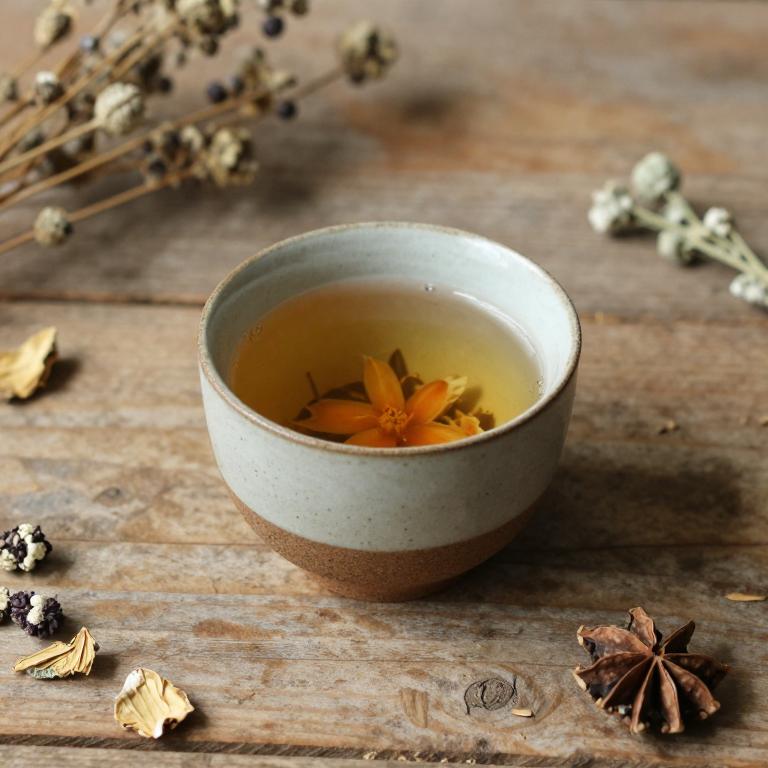10 Best Herbal Teas For Joint Pain

Herbal teas have gained popularity as a natural remedy for joint pain due to their anti-inflammatory and pain-relieving properties.
Commonly used herbs such as turmeric, ginger, and willow bark contain compounds that may help reduce inflammation and ease discomfort in the joints. These teas are often preferred over pharmaceutical options because they are generally considered safe and have fewer side effects. Many people find relief by regularly consuming these herbal infusions, either alone or in combination with other natural therapies.
However, it is advisable to consult with a healthcare professional before incorporating herbal teas into a treatment plan, especially for those with existing health conditions or taking other medications.
Table of Contents
- 1. Turmeric (Curcuma longa)
- 2. Salvia (Salvia officinalis)
- 3. Ginger (Zingiber officinale)
- 4. Field horsetail (Equisetum arvense)
- 5. Indian frankincense (Boswellia serrata)
- 6. Black pepper (Piper nigrum)
- 7. Sacred lotus (Nelumbo nucifera)
- 8. Common grape (Vitis vinifera)
- 9. Chaste tree (Vitex agnus-castus)
- 10. Licorice (Glycyrrhiza glabra)
1. Turmeric (Curcuma longa)

Curcuma longa, commonly known as turmeric, is a popular herbal remedy used in teas to alleviate joint pain due to its active compound, curcumin, which possesses strong anti-inflammatory and antioxidant properties.
When brewed into a tea, curcuma longa can help reduce inflammation in the joints, potentially easing symptoms of conditions like osteoarthritis and rheumatoid arthritis. The tea is often combined with black pepper to enhance the absorption of curcumin, making it more effective. Regular consumption of turmeric tea may support overall joint health and mobility, though it is best used as a complementary therapy alongside conventional treatments.
However, it is important to consult a healthcare professional before incorporating turmeric tea into a health regimen, especially for those with existing medical conditions or taking medications.
2. Salvia (Salvia officinalis)

Salvia officinalis, commonly known as sage, is a versatile herb that has been traditionally used in herbal teas to support joint health and alleviate pain.
The anti-inflammatory and antioxidant properties of sage may help reduce inflammation in the joints, potentially offering relief for conditions like arthritis. When brewed into a tea, sage can be consumed regularly to support long-term joint comfort and mobility. It is often combined with other herbs such as ginger or turmeric to enhance its therapeutic effects.
However, it is important to consult a healthcare professional before using sage tea, especially for individuals with existing medical conditions or those taking medications.
3. Ginger (Zingiber officinale)

Zingiber officinale, commonly known as ginger, has been widely used in herbal teas to alleviate joint pain due to its anti-inflammatory and analgesic properties.
The active compounds in ginger, such as gingerol and shogaol, help reduce inflammation and pain associated with conditions like arthritis and osteoarthritis. Drinking ginger tea regularly can provide a natural and soothing remedy for individuals seeking relief without the side effects of pharmaceutical medications. To prepare the tea, fresh or dried ginger root is typically steeped in hot water for several minutes, allowing the beneficial compounds to be extracted.
While ginger tea is generally safe for most people, it is advisable to consult a healthcare professional before using it as a long-term treatment for chronic joint pain.
4. Field horsetail (Equisetum arvense)

Equisetum arvense, commonly known as field horsetail, has been traditionally used in herbal teas to support joint health and alleviate pain.
Rich in silica and other minerals, this herb is believed to help reduce inflammation and promote the repair of connective tissues. When brewed into a tea, equisetum arvense may provide a natural remedy for conditions like arthritis and joint stiffness. However, it should be used with caution, as it can have diuretic effects and may interact with certain medications.
As with any herbal remedy, it is advisable to consult a healthcare professional before incorporating equisetum arvense into a treatment regimen for joint pain.
5. Indian frankincense (Boswellia serrata)

Boswellia serrata, also known as Indian frankincense, is a herbal remedy that has been traditionally used for its anti-inflammatory properties.
Herbal teas made from Boswellia serrata extract are gaining popularity as a natural alternative for managing joint pain, particularly in conditions like osteoarthritis and rheumatoid arthritis. The active compounds in Boswellia serrata, such as boswellic acids, work by inhibiting the production of inflammatory enzymes, thereby reducing pain and swelling. Studies suggest that regular consumption of Boswellia serrata tea may lead to improved joint function and decreased reliance on conventional pain medications.
However, it is important to consult with a healthcare provider before using this herb, especially for individuals with existing medical conditions or those taking other medications.
6. Black pepper (Piper nigrum)

Piper nigrum, commonly known as black pepper, is often used in herbal teas to support joint health and alleviate pain.
The active compound in black pepper, piperine, is believed to possess anti-inflammatory and analgesic properties that may help reduce joint inflammation and discomfort. When brewed into a tea, black pepper can be combined with other herbs like turmeric or ginger to enhance its potential benefits for arthritis and joint pain. However, it is important to consult with a healthcare provider before using black pepper tea, especially for individuals with gastrointestinal issues or those taking medications.
While some studies suggest that piper nigrum may offer relief for joint pain, more research is needed to fully understand its efficacy and safety.
7. Sacred lotus (Nelumbo nucifera)

Nelumbo nucifera, commonly known as the sacred lotus, has been traditionally used in Ayurvedic medicine for its therapeutic properties, including its potential benefits for joint pain.
The leaves and seeds of the lotus plant are often used to prepare herbal teas that are believed to reduce inflammation and support joint health due to their anti-inflammatory and analgesic compounds. These teas may help alleviate symptoms associated with conditions like arthritis by promoting the body's natural healing processes and reducing oxidative stress. The mild, aromatic flavor of lotus tea makes it a pleasant and accessible option for those seeking natural remedies.
However, it is advisable to consult with a healthcare professional before incorporating it into a treatment regimen, especially for chronic joint conditions.
8. Common grape (Vitis vinifera)

Vitis vinifera, commonly known as the grapevine, is a plant that has been traditionally used in herbal medicine for its potential health benefits, including support for joint pain.
Herbal teas made from Vitis vinifera, particularly its leaves and seeds, are believed to contain compounds such as resveratrol, which may have anti-inflammatory and antioxidant properties. These properties are thought to help reduce inflammation and oxidative stress in the joints, potentially alleviating symptoms of conditions like arthritis. While some studies suggest that Vitis vinifera may offer relief for joint discomfort, more clinical research is needed to fully understand its efficacy and safety.
As with any herbal remedy, it is advisable to consult a healthcare professional before incorporating Vitis vinifera tea into a treatment plan for joint pain.
9. Chaste tree (Vitex agnus-castus)

Vitex agnus-castus, commonly known as chaste tree, is a herbal remedy that has been traditionally used to support hormonal balance and alleviate symptoms of joint pain.
While it is not a direct treatment for joint inflammation, it may help reduce stress and anxiety, which can indirectly contribute to joint discomfort. Some studies suggest that the phytoestrogens in vitex may have anti-inflammatory properties that could benefit individuals with conditions like arthritis. When used as a herbal tea, vitex is typically consumed in moderation and is often combined with other herbs to enhance its therapeutic effects.
As with any herbal supplement, it is advisable to consult a healthcare professional before incorporating vitex into a regimen for joint pain management.
10. Licorice (Glycyrrhiza glabra)

Glycyrrhiza glabra, commonly known as licorice root, has been traditionally used in herbal medicine for its potential anti-inflammatory and analgesic properties.
When brewed into a tea, licorice root may help alleviate joint pain by reducing inflammation and supporting the body’s natural healing processes. The herb contains compounds like glycyrrhizin, which may inhibit enzymes involved in inflammatory responses. However, long-term use of licorice root tea can lead to side effects such as high blood pressure and fluid retention due to its effects on the adrenal glands.
As a complementary therapy, licorice root tea should be used under the guidance of a healthcare professional, especially for individuals with preexisting health conditions.